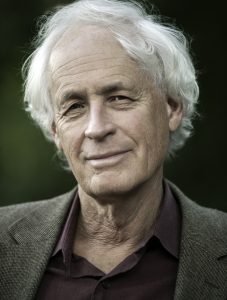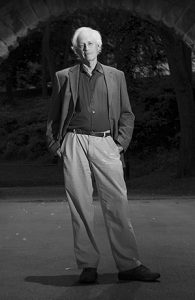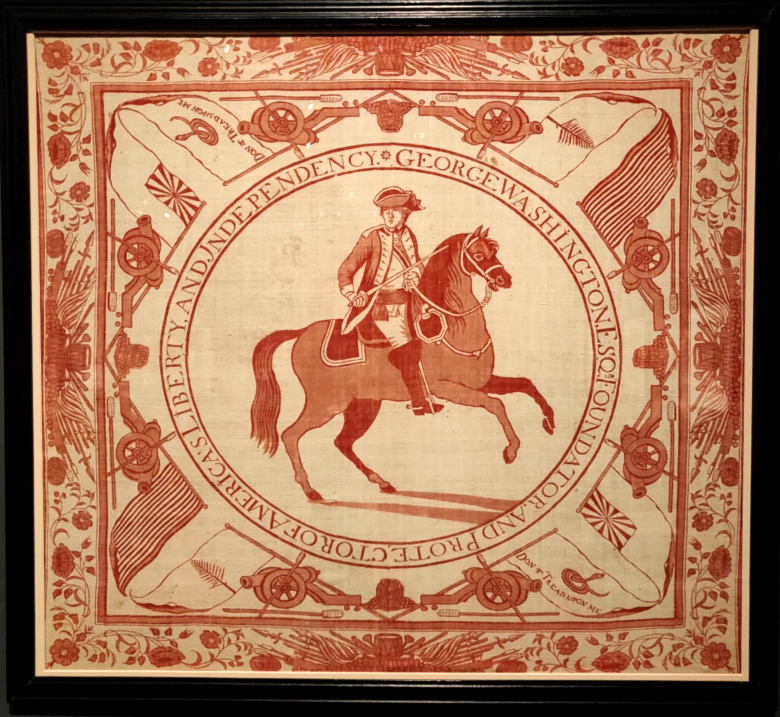 If Ray Raphael had a personal mission statement, it would likely be three sentences from a recent profile story in Reed magazine:
If Ray Raphael had a personal mission statement, it would likely be three sentences from a recent profile story in Reed magazine:
Ray wants to rescue history from mythology. He wants our understanding of revolutionary America to be based on evidence, not ideological convenience. And he won’t stop until he gets it right.
I’ve had the privilege of working closely with Ray since 2011 and am a great admirer of his many works on the Revolution, including A People’s History of the American Revolution: How Common People Shaped the Fight for Independence, The First American Revolution: Before Lexington and Concord, Founding Myths: Stories that Hide Our Patriotic Past, and Founders: The People Who Brought You a Nation.
Taking a break from his regular MythBuster contributions to Journal of the American Revolution, Ray recently answered a few of my questions about his excellent adventure that is rescuing history from mythology.
1 // You’ve dedicated a large chunk of your writing career to debunking myths about the American Revolution and Founding period. What prompted this passionate journey?
When researching for People’s History of the American Revolution, I discovered that the people of Massachusetts (except the 5% who lived in Boston) had completely cast off British authority the year before Lexington and Concord. One might think any narrative of any revolution would feature the first transfer of authority from the old regime to the new one – that’s what revolutions are all about, after all. In the standard telling, however, the Massachusetts Revolution of 1774 is not even mentioned. Why not? Who’s the gatekeeper? That question underlies all the rest. History is blind unless we uncover the story of the story and ask why we prefer some over others.
2 // Some may argue that you’re being too nitpicky or critical of our nation’s folklore, which itself becomes part of America’s fabric. Why is it important to dispel even the most beloved of America’s legends?
Stories we choose to tell can hide others we should tell. If Lexington and Concord marked the beginning of the Revolution, there can be no revolution prior to April 19, 1775. If Paul Revere woke up the sleepy-eyed farmers, those farmers could not have already overturned British authority. One critic of my Molly Pitcher deconstruction commented, “Myth or not it’s still a nice story which does no harm to anyone. Why not just let it alone?” But if we let that story stand, as innocent as it seems, then we infer that women carried water to soldiers in dainty dinnerware and George Washington, on his own accord, made a woman an officer. This is an injustice to the struggling camp followers who received half rations at best, were never commissioned as officers, schlepped water in heavy buckets, and schlepped a whole lot else as well. False stories lead to false inferences and faulty history.
3 // Which debunked myth do you consider to be the most controversial? Most important?
Most controversial:
- Strangely, the folktale of Molly Pitcher and Mary Hays McCauley has probably created more controversy than the others. My discovery of the first declaration of independence by a public body, 21 months before the Congressional Declaration, is not exactly controversial (Pauline Maier, who uncovered 90 such declarations but at later dates, endorsed this finding), but it has not received the attention it should.
Most important:
- America’s victory is not really the story of David whipping mighty Goliath. Even after Yorktown, with 40,000+ troops still stationed in North America and the West Indies, Britain could have fought on, but the War for Independence had escalated into a global conflict. Three world powers had joined an anti-British alliance and others had withdrawn trade, so Parliament, against the wishes of King George III, saved the Empire by strategically retreating from America.
- Samuel Adams did not train the Boston mob to do his bidding, he was not a one-man revolution, and he did not push for independence a decade before others did. Personally conservative, he fought for the rights of Englishmen until that no longer proved viable. This myth leads us to misconstrue the very nature of revolution.
- Although the British move on Lexington and Concord led to the first bloodshed, the actual revolution was well under way by then. That attack was a counter-revolutionary strike at a land the British government had already lost.
4 // Have you seen the fruits of your labor? Do you often see authors or publishers make copy changes as a result of your work?
I’ve seen some response. When I call an author’s attention to a particular myth, he or she generally responds and corrects it if possible. So far, however, I’ve only approached people I suspect will be approachable. I’m about to cast my net wider by contacting more authors and editors and creating a “check the textbook” website. We’ll see how that develops. One textbook editor has commented, “I don’t want to get too far ahead of the curve.” Such is the power of tradition.
5 // Are history textbooks the worst offenders?
They are offenders, especially because they sway young people. Some are improving in some respects, though. That tends to happen when a constituency, like women or African-Americans or Native Americans, pushes for inclusion.

6 // What tips can you give general readers to develop a more discerning eye for fact vs fiction?
First off, historical stories are like rumors: the better they are, the more likely they will survive on their own, regardless of the evidence. To see if a good story is well founded, look for contemporaneous documentation. Examine each document for intent as well as content. Who is telling the story and why? Pay attention to the exact chronology and circumstance, as these affect meaning. Ignore all Nineteenth Century overlays – these are responsible for many of our illusions. Too many later recollections of the Revolution are passed off as primary sources, which they are not. Fuzzy dating is as dangerous in history as it is in romance.
7 // We recently published an article listing the ages of Founding Fathers, ranging from Andrew Jackson, 9, to Samuel Whittemore, 81. The list stirred some good questions about the definition of “founder” and whether certain individuals should make the list. As the author of Founders: The People Who Brought You a Nation, how does Ray Raphael define a founder? Who do you consider to be the first founder? The last?
I don’t care for the term “Founder” because it usually denotes only a small group of familiar names. Admittedly, “Founder” or “Founding” appears in the title of four of my books, but I’m always trying to broaden the concept. Our nation was created by a host of people who worked in concert and in opposition, “making history.” My Founders book is a conscious attempt to get that across. I weave a sweeping narrative around seven characters, some high, some low. I could have chosen others. You could too. Anyone can. Try it, it’s great sport. You’ll see how interconnected things were.
8 // What historians have most influenced your work?
I’ve had two mentors, Al Young and Pauline Maier. I learned much from Al long before we worked together on a book, first through his writing, then through long conversations in which he shared his broad familiarity with the field. Pauline, over the last few years, has been my closest colleague and a good friend. She’s absolutely meticulous, just my cup of tea, and many of my deconstructions stem from her work. Al died last November, Pauline this August. I work with fellow historians (Gary Nash, John Bell, and others), but even so, having lost two mentors so recently, I feel uncomfortably on my own just now, not my choice. History is a collegial enterprise.
9 // Which of your books is most personally satisfying and why?
Which of your kids do you like the best? I prefer to dodge the question. My two favorites are whichever one I just finished (right now that’s Constitutional Myths) and whichever one I’m working on at the moment. Currently that’s a revised edition of Founding Myths. It’s a welcome “Groundhog Day” opportunity, a chance to revisit my work with ten more years of living in the late Eighteenth Century under my belt, and perhaps a more mature perspective. This time I’m toning down the populism a bit (some critics think I harped too much on that, and I agree) and beefing up the historical inquiry, what the book is really all about. I’m also looking at which myths are most persistent, some surprises there, and how recent developments in education – document-based questions and the Common Core – can be used to address historical mythologies.
10 // We’re constantly learning new things about the American Revolution. What new or exciting thing about the American Revolution have you recently learned or discovered?
Pauline Maier, after finishing Ratification, had been trying to discover when the first ten amendments became known as the “Bill of Rights.” I joined her as she poured over 19th century textbooks in Harvard’s Gutman Library, which contains thousands of them. That was great fun, two kids in a candy shop – I recommend the Gutman to anyone who wants to see how our national narrative unfolded through time. Surprise result, which I resisted at first until Pauline finally convinced me: no big deal over a “Bill of Rights,” a coherent body called by that name, till Reconstruction, and it didn’t really come into its own until the second quarter of the 20th century. Unfortunately, Pauline hadn’t yet published her research when she became ill, but she did summarize her findings in a talk she gave at Georgetown Law School (the talk starts at minute 15).
11 // Which new (since 2008) or soon-to-be-published books about the American Revolution are most intriguing to you?
I’m now reading Book of Ages, Jill Lepore’s amazing reconstruction of the life of Jane Franklin, Benjamin’s sister, based on mere shreds of evidence. I’m looking forward to a collection of essays called Remembering the Revolution: Memory, History, and Nation-making from Independence to the Civil War, co-edited by Michael McDonnell and others, just released. There are not many books published in my special field of interest, the etymology of mythologies, so I’m eager to read it. The two sample chapters I have seen are excellent.
12 // What books – other than your own – do you consider essential to any American Revolution buff’s library?
Joseph Plumb Martin’s Narrative – it’s priceless. John Shy’s A People Numerous and Armed, for its relaxed and fluid style as well its content. For reference on battlefield stats, perhaps Howard Peckham’s Toll of Independence. (Query to Revolutionary War buffs: how reliable is he? I haven’t checked his work against primary sources). Unfortunately, the edited and often annotated collections of dozens of well-known figures on both sides of the conflict are too expensive for a home library, but the Internet abounds with good primary material available in a flash. The site I use most is the Library of Congress’s American Memory, Century of Lawmaking for a New Nation, which includes the Journals of the Continental Congress, Letters of Delegates to Congress, Farrand’s Records of the Federal Convention (including Madison’s Notes of Debates), and many other sources. The Online Library of Liberty is another good umbrella site. Check out the first item, American Political Writings during the Founding Era, a great collection, and many others. Three of the four original histories of the Revolution (David Ramsay, Mercy Otis Warren, and John Marshall) are here. Peter Force’s American Archives, Fourth Series (1774-76) and Fifth Series (1776-1783) is now online. And speaking of online, John Bell’s Boston 1775 blog is unrivaled for Boston and the early stuff. Do readers have other Internet mega-sources they’d like to share? Please comment.









8 Comments
Great interview, packed with good follow up resources. I’d love to see more author interviews.
Thanks, Roger. In addition to Raphael, we’ve interviewed Philbrick, Fleming, Troiani, Innes, Edwards, Mayer, Breen, Bell and Wood. Our interviews are listed under the “Features” menu. Enjoy!
Enjoyed reading your debunking and attempts to set the record right. Keep up the good work.
Interesting interview, Ray. My American History to 1865 class just went through the War of American Independence last week. The issue of heritage vs. history was a major thread. This week we’re going through the creation of the Constitution so we’re still in the same region of time. I’m going to link this interview so that they can read what you said about the myths.
Ray, I always enjoy your work. I have found http://www.archive.org useful – and often helpful when tracking down 19th century “add-ons” and embellishments to history.
Thanks, Hugh. Any tips on how to navigate that umbrella site, getting it to focus on the American Revolution?
Ray – It is very hard to navigate. I feel often that it is hit or miss….but, when it hits it can be very good. I usually play around with many search words or keep it simple like “Charles Lee Monmouth.” One puzzle is why some obscure sources show up yet others – out of copyright – do not.
Excellent interview. Keep on debunking, Ray.